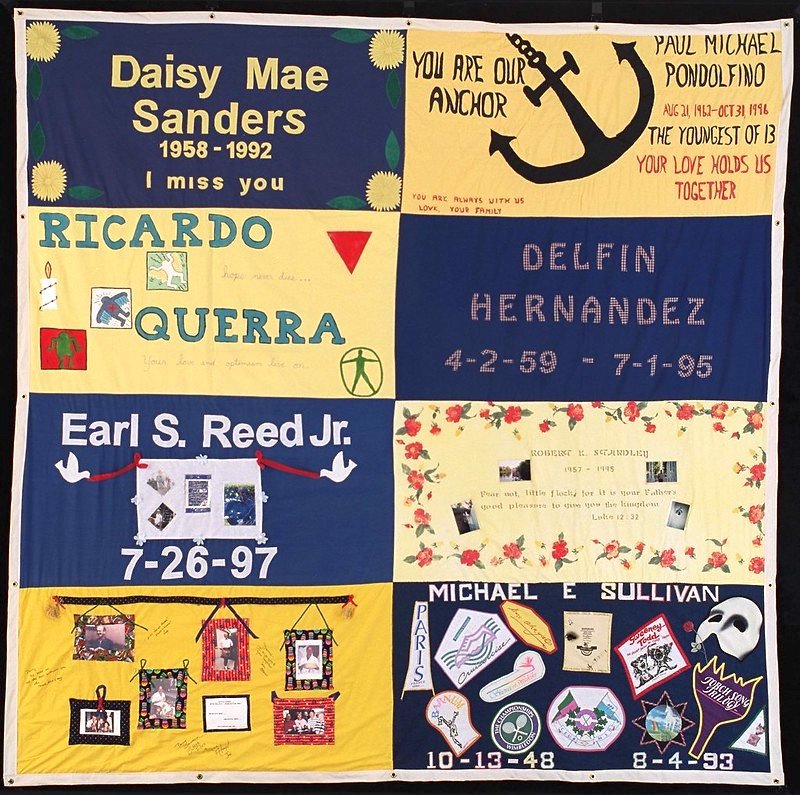Honoring the Legacy of HIV/AIDS
A panel from the AIDS Memorial Quilt; courtesy of National AIDS Memorial.
Honoring the Legacy of HIV/AIDS Through Remembrance
December 1 is World AIDS Day, established in 1988 to raise awareness of the HIV/AIDS pandemic and honoring those who have died. For over 35 years, one of the most powerful symbols has been the AIDS Memorial Quilt, conceived by activist Cleve Jones in 1985. Just two years after its first handmade panels were joined together, the Quilt was the size of a football field and had grown to 1,920 panels when it was first displayed on the National Mall in Washington D.C. in 1987. Today, the quilt weighs 54 tons and has nearly 50,000 panels, making it the largest community art project ever created.
The 10-acre National AIDS Memorial Grove, established in 1991 in San Francisco’s Golden Gate Park, was also born out of pain and loss. In 2019 the National AIDS Memorial became the permanent custodian of the Quilt, which returned to its home city of San Francisco.
We interviewed John Cunningham, the CEO of the National AIDS Memorial, to learn about the organization’s current initiatives.
Tell us about your plans for this year’s World AIDS Day.
JC: As we have for the past 25 years, our annual World AIDS Day National Observance returns for a powerful in-person event in the National AIDS Memorial Grove. This year’s theme is “Change the Pattern for A Future without AIDS.” More than 500 guests and dignitaries will come together for an event streamed nationally for important conversations. These conversations will be moderated by ABC 7 news anchor Reggie Aqui as well as Michelle Meow of the Commonwealth Club. First is a conversation with Cleve Jones, the founder of the Quilt, reflecting on 35 years of the Quilt’s history and how it changed not just the response to AIDS in the U.S. but around the world. Next is a conversation about the current state of the epidemic with Dr. Diane Havlir, Chief of HIV Infectious Diseases at UCSF; Dr. Tyler TerMeer, CEO of the San Francisco AIDS Foundation; L.S. Jones, of Prevention Access Campaign Mississippi; and California State Senator Scott Weiner. Finally, there will be a conversation moderated by Michelle Meow focused on youth and future leaders and how they’re looking at the pandemic. The entire event will be broadcast and available on our website from 5:00 p.m. PT on December 1.
For a decade, the National AIDS Memorial has organized a “Surviving Voices” project. What can you tell us about the focus for 2023?
JC: As our nation’s only federally designated memorial to AIDS, we feel strongly that it is our responsibility to share not just the stories of the lives lost but the impact of stigma, racism, marginalization and otherism, as well as activism, love, compassion, and heroism to ensure that never again will any community be impacted the way so many were with AIDS. “Surviving Voices” is an oral history and documentary project that began because memorializing is much more than just the names engraved within the Memorial or stitched onto the Quilt. What matters are the stories behind those names.
To honor the lives lost from something as complex and impactful as HIV/AIDS, with its long history of stigma, we need to capture these stories before they are lost forever. Each year we select an impacted community to focus the camera on and build an advisory body to oversee interviews with the communities being highlighted. In 2018 it was the Asian/Pacific Islander community, in 2019 the transgender community, in 2020–2021 substance users and the recovery community, and this year we focused on the Black community and AIDS with 18 interviews from around the country. Each interview runs 15 to 20 minutes and there’s also a mini documentary about the same length that pulls together the themes and threads of the interviews.
In 2023 the theme is the Quilt panel-makers’ community: we want to tell the arc of their stories as they relate to the power of panel-making as a process of memorializing and healing. Oftentimes, panels are made collectively by families and community groups, so we want to document these collaborative efforts. We’ll also be chatting to panel-makers from 30 years’ ago, talking to them about their history since they first created a piece.
Tell us about the National AIDS Memorial’s new “It’s Time to Change the Pattern” initiative.
JC: In the fight against HIV/AIDS, we have a responsibility to focus attention strategically on areas where we can “break the back” of the epidemic. That’s where the hard work is today, reaching the communities that have high or rising infection rates and where there are unique but familiar challenges. Since the beginning of the pandemic, the underlying drivers of HIV/AIDS have continued to be factors such as discrimination, stigmatization, racism, and lack of access to healthcare. The National AIDS Memorial, the Southern AIDS Coalition, and Gilead Sciences aim to “Change the Pattern” in the South, especially in Black and Brown communities.
Gilead has provided tremendous funding and support, while the Southern AIDS Coalition is on the ground and has a history of working in communities of color in the South. It is providing great support in both reaching those most in need and delivering a message that resonates and is culturally competent. The localities we chose are informed both by where infection rates are high and through regional focus groups. We launched the initiative last month in Jackson, Mississippi and will be in Alabama from November 30 through December 4, touching Montgomery, Selma, and Birmingham.
In each location there are five to seven days of exhibitions and programming centered around panel-making and the Quilt, working with local community partners to host free educational forums, events and other activities. The Quilt is the centerpiece of the initiative because quilting is such quintessential Americana. It generates participation and collaboration among disparate communities. The point is to get conversations going and empower people in the response against the pandemic, with emphasis on women, youth, and prevention. We’ll be moving throughout the South in 2023.
NOTE: Every panel of the AIDS Memorial Quilt can be viewed online through the Memorial’s Interactive AIDS Quilt. The American Folklife Center at the Library of Congress holds the accompanying archival collection of over 200,000 objects, documents and other materials chronicling the lives of those memorialized in the Quilt.
John Cunningham is the CEO of National AIDS Memorial and has nearly four decades of work as a community organizer and leader in the AIDS movement. John is a long-term survivor and is committed to ensure we together bring an end to the AIDS crisis and prevent communities from being devastated due to discrimination and hate.


